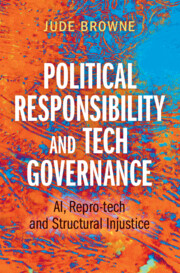Book contents
- Political Responsibility & Tech Governance
- Political Responsibility & Tech Governance
- Copyright page
- Dedication
- Epigraph
- Contents
- Preface
- Acknowledgements
- Introduction
- Chapter 1 The Problem of Structural Injustice
- Chapter 2 Artificial Intelligence and Ground Truth
- Chapter 3 Repro-tech and the Genetic Supermarket
- Chapter 4 Putting the Public into the Public Body
- Chapter 5 Conclusion
- Appendix Legal, Moral and Structural Actions, Injustices and Responsibilities
- References
- Index
Chapter 3 - Repro-tech and the Genetic Supermarket
Published online by Cambridge University Press: 21 February 2025
- Political Responsibility & Tech Governance
- Political Responsibility & Tech Governance
- Copyright page
- Dedication
- Epigraph
- Contents
- Preface
- Acknowledgements
- Introduction
- Chapter 1 The Problem of Structural Injustice
- Chapter 2 Artificial Intelligence and Ground Truth
- Chapter 3 Repro-tech and the Genetic Supermarket
- Chapter 4 Putting the Public into the Public Body
- Chapter 5 Conclusion
- Appendix Legal, Moral and Structural Actions, Injustices and Responsibilities
- References
- Index
Summary
What will our reproductive habits look like in the future, and why does it matter? Part of the answer to this question is the use of in vitro pre-implantation genetic technologies (PGTs). Originally designed to screen for a range of genetic conditions such as sickle cell disease or Huntington’s disease, new markets are set to emerge where prospective parents will be promised the opportunity to select the personality characteristics of their unborn children: this is what the political theorist Robert Nozick (1974) thought would result in a ‘genetic supermarket’. Unlike the case of AI, there has been a long-standing tradition of regulating Repro-tech. The UK’s Human Fertilisation and Embryonic Association (HFEA) is a regulatory public body created in 1990 in light of a report authored by the philosopher Mary Warnock. It is widely regarded internationally as the gold standard of regulators and the first to govern technologies as complex as gene-editing and cloning. However, though we might see some elements of promise in Warnock’s approach for a wider model of technology governance, I consider what I see as the general demise of regulatory landscapes in line with the dominant US-based ‘state capture’ school of thought.
Keywords
- Type
- Chapter
- Information
- Political Responsibility and Tech GovernanceAI, Repro-tech and Structural Injustice, pp. 86 - 118Publisher: Cambridge University PressPrint publication year: 2025

